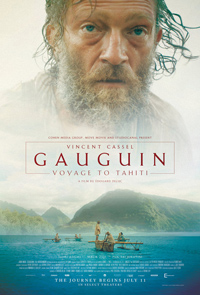Tahitian Treat: Cassel Casts a Gloom in Sanitized Biopic of a Starving Artist
 He’s one of the more notable post-Impressionists and for the first time and he gets his own partial cinematic biopic courtesy of Edouard Deluc with his sophomore project Gauguin: Voyage to Tahiti. The artist, of course, is Paul Gauguin, who ruined his health but cemented his iconicity in the latter half of his life when he abandoned his wife and children and absconded to French Polynesia.
He’s one of the more notable post-Impressionists and for the first time and he gets his own partial cinematic biopic courtesy of Edouard Deluc with his sophomore project Gauguin: Voyage to Tahiti. The artist, of course, is Paul Gauguin, who ruined his health but cemented his iconicity in the latter half of his life when he abandoned his wife and children and absconded to French Polynesia.
Like many of his contemporaries, his works were not a prized commodity until after his death, and as the parenthetical indicates, this treatment expressly navigates his most prolific artist period while languishing in Tahiti. Headlined by French star Vincent Cassel, this is a sobering, somber portrait of a man consumed by his artistic passions. Aptly performed and making cinematographic use out of the tropical locale, the whole affair plays like a heavily sanitized version of a portrait of a troubled and troubling artist. Prizing the perspective of the colonizer, several of Gauguin’s more choice exploitations aren’t explored with any real depth, which robs this potentially compelling narrative of the real-life horrors of its subject (which come across more vibrantly in some of Gauguin’s works—Arii Matamoe aka The Royal End, for instance).
Uninspired by the drabness of Paris, painter Paul Gauguin sailed to French Polynesia between 1891 and 1893, where he would create some of his most famous works of art. Inspired by Gauguin’s own account, this otherwise fictionalized endeavor focuses on the artist who, as his health begins to fail him, embarks on a romance with local maiden Tehura (Tuhei Adams), a girl offered to him by her parents. Bonding over art, they make for a mostly compatible pair until Jotepha (Pua-Tai Hikutini), a strapping local lad, catches her eye.
Although Deluc seems to shirk any semblance of shock value, the film’s most glaring error is how it glosses over the age difference between Gauguin (who was forty-eight years of age at the time) and Tehura (who was a thirteen-year-old girl). Tuhei Adams was reportedly seventeen-years-old during the film’s production, itself a potential controversy which could account for the film’s absence at any major film festival (its surprise US distribution is thanks to Cohen Media Group).
The feather in Deluc’s cap is obviously Cassel, who gives a laudable performance as the offbeat Gauguin, a man desperate to escape the European experience (which is what drove the artist from Europeanized Pape’ete to the isolated Mataiea). Ignoring how his own privilege allowed him to cart his brood from France to Denmark before eventually abandoning them altogether to pursue his artistic endeavors (at least according to Deluc’s depiction), this is clearly a Cassel-centric endeavor, yet it fails to ignore the self-centeredness and narcissism which enabled Gauguin to abandon one wife and then exploit a child-bride (a relationship which makes up the crux of the second half of the film).
Cassel does all the right things, displaying artistic tics and temperaments as he disappears into Gauguin’s sallow, sickly, diabetic stupors. And yet, how crazy good would have this biopic have been had some irresponsible New Wave auteur shunted the type-cast Klaus Kinski into the madness of Gauguin’s tropical idyll? With that in mind, perhaps this would have been a biopic actually better suited for something less stoic, something less intrinsically nationalized. Imagine, for a minute, if Kinski’s sole modern descendent, Nicolas Cage, were allowed to run wild in Tahiti, gnashing and gnarling his way through canvas and cloth, flesh and virtue?
Based on Paul Gauguin’s own memoirs, Deluc’s trouble begins with an adapted screenplay which seems more inclined towards a travelogue. Writer and producer Etienne Comar (who had similar issues with his own directorial debut, 2017’s Django, a biopic on musician Django Reinhardt as he eluded the Nazis) seems inclined towards providing extremely neutered versions of extraordinary chapters from noted historical figures (though writers Thomas Lilti and Sarah Kaminsky are also partially to blame for this missed opportunity).
Where’s the Jean Rhys inspired version of Tehura’s romantic inclinations or the anguish of Mette Gauguin’s abandonment? The ridiculous love triangle afforded Tehura in Gauguin still only utilizes her as a cypher (and incorrectly paints the famously free loving artist as a cuckolded victim). But at least DP Pierre Cottereau (Café de Flore, 2011) gets some sumptuous landscapes of Tahiti.
★★/☆☆☆☆☆


